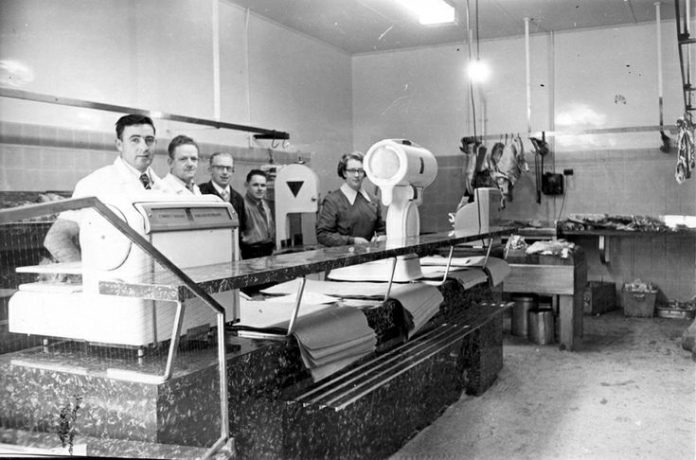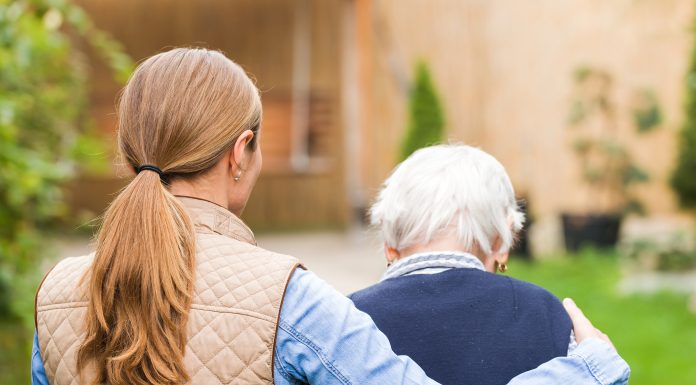“If a story is in you, it has got to come out.”
William Faulkner
‘There’s no sawdust on the floor in your butcher shop.’ I said to a local Kingston butcher as he cut my meat.
‘There’s hasn’t been for years.’ He answered.
‘Don’t they carry hind quarters in through the front door?’ I asked.
‘The meat comes pre-cut now.’ He replied.
‘I worked in a butcher shop as a boy and we had sawdust and blood on the floor.’ I said.
Then I told him about Tulloch & Luxton’s Butcher shop at Broadview and Browning in Toronto where I worked every Friday night and Saturday when I was fourteen years old during the sixties.
They smoked cigarettes while they served customers and many customers smoked cigarettes while being served.
When they weren’t serving people or cutting meat Jim and Del sat on a wooden bench behind the big walk-in meat cooler and drank whiskey while reading racing forums. They studied race results and knew the names of the horses and the jockeys who rode them.
Their bookie came in Friday night to take their bets. On Saturday afternoon the races from Woodbine where called live on the radio. I often watched as they waited anxiously to hear the magic words, ‘They’re at the post. They’re off,’’ from the transistor radio hanging by a nail at the window in the back room.
The bookie drove a big car and had a big smile. He asked me a question on his way out the door one Friday night while I swept sawdust from the wood floor. He said, ‘Do you want a tip on the races?’
Before I could answer he pointed at me and said, ‘Don’t bet the horses.’
On Friday night I answered the phone and wrote down the details of customer orders for delivery using a yellow pencil and paper pad. Del told me that no matter what people ask for to always say we have it. If we didn’t have it, I went next door to Foy’s grocery store and bought everything from cigarettes to tooth paste. Del showed me how to bump up the cost of the items that I bought from Foy’s Grocery by ten percent. That’s where I learned what mark-up meant, a word I would later see for the first time in a text book when I went to college years later.
Saturday I helped Jimmie deliver meat and groceries in cardboard boxes in a white van which he drove from our side of the Don Valley across the viaduct to the mansions in Rosedale, which is still one of the richest neighbourhoods in Canada.
Many of those mansions had small signs at the front door that said, “Make deliveries at the back door.”
When I rang the bell at the back door or side entrance the owner never answered. It was always a maid or a cook. “There’s someone like me,” I would think to myself.
I carried the boxes into big shiny kitchens with walk-in coolers like the one at the butcher shop. Many of those kitchens were bigger than the butcher shop and some of the houses in my neighbourhood.
At work I felt more important when I got to wear a bloody butcher’s apron while boning meat which I later ground up to make sausage in the basement. I was also responsible for setting and emptying the mouse traps in the basement which had one light bulb hanging at the end of a cord from the ceiling.
Del showed me how one sunflower seed could be jammed into a niche in the trap so that same seed could be re-used to catch numerous mice. That was also the first and only time I set a rat trap and saw a dead rat.
When I gave Del the update about my success in the basement he would often say, ‘Don’t tell the people in the store about all our mouse traps.’
He didn’t have to tell me that my job depended on it.
I emptied the traps in a plastic bag that I put in a metal garbage can in the lane behind the shop.
That’s where crazy Joe lived one summer. He wore a cowboy hat and boots and lived in a garage where he spent most of his time drinking beer. His home had a dirt floor, a metal cot, numerous suit cases, a plastic table with chairs and an old couch. His savings were empty bottles he kept in cardboard cases that lined the walls of his garage home.
Jim and Del always told me to stay away from crazy Joe and that garage but I still looked in the window.
I saw Joe again years later sitting in a wheelchair wearing a cowboy hat in front of the Broadview subway station a half mile from the garage and butcher shop which were gone by then like both of Joe’s legs.
The butchers and the boozing and the bookie and the bum were an important part of my early education. So were the mouse traps and big mansions with the small signs at the front door. The people living there had money and just about everyone else I knew didn’t except maybe the bookie.
Because of that job at the butcher shop, I paid attention in school and never had to be told to do my homework. I knew at an early age that I would get a good education and have money. For me, school was never fun. It was necessary.
I didn’t know then how fortunate I was to work at that butcher shop. What I received went far beyond that big ten dollar bill they gave me every Saturday night at closing time.
A year later I moved on to a better paying part time job at a big chain grocery store. It had a punch clock and twelve aisles. There was a meat department with butchers who wore black bow ties. But they still had mouse traps.
I never went back to visit or thank Jim and Del. Until now.

























